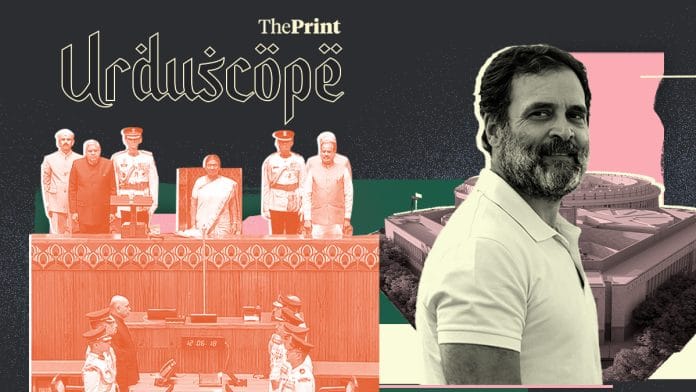New Delhi: Rahul Gandhi’s acceptance of the position of leader of the Opposition, and his centrality to both the Congress and the BJP’s strategies, kept the Urdu press abuzz this week.
Other key issues that dominated the front pages of newspapers included the Congress’s political strategy, the Bharatiya Janata Party’s (BJP) counter-efforts and the NEET exam paper leak. Editorials also covered India-Bangladesh relations as well as parliamentary responsibilities and decorum.
Here’s a wrap of the big stories and editorials from the Urdu press this week.
Rahul Gandhi as central figure
On Thursday, Siasat said in an editorial that Rahul Gandhi has emerged as a central figure in Indian politics, with the Congress’s political strategy often revolving around him due to his popularity. The BJP also focuses on him, running campaigns to tarnish his image and scrutinise his every move, the newspaper asserted.
According to the paper, in his new position as the leader of the Opposition in the Lok Sabha, Gandhi’s accusations against the BJP-led central government cannot be ignored.
On Thursday, Inquilab‘s editorial also praised Gandhi for accepting the role of leader of the Opposition leader in the Lok Sabha, marking his first formal acceptance of a statutory position. While previously, he had often rejected leadership offers without giving proper responses, this move allows him to engage directly with opponents and deflect criticism that he avoids responsibilities, it said.
18th Lok Sabha
On Friday, Roznama Rashtriya Sahara‘s editorial said it was not unusual for the President to praise the government in their address; rather, it was tradition. This was referring to President Droupadi Murmu’s address Thursday to the joint session of Parliament.
The President’s address outlines the government’s policy priorities and plans for the upcoming year, it said, adding that Murmu followed this tradition but also criticised the Opposition on the NEET exam “paper leak”.
The editorial argued that “success will be credited to the Modi government, while failure will be blamed on the Opposition”. It also aired concerns over “suppression of freedom of expression, violation of democratic principles, and deprivation of the rights of minorities and Dalits”.
On Thursday, the newspaper’s editorial said that Om Birla, who was re-elected as Lok Sabha Speaker Wednesday, had played a “key role in silencing the Opposition during his previous term, defending the government in debates, removing opposition statements, turning off microphones, suspending MPs, and passing controversial bills”.
His actions raise doubt about whether he will act as a true guardian of parliamentary democracy or continue to support the ruling BJP’s authoritarian style, the editorial added.
On Wednesday, Siasat‘s editorial called for both the government and the Opposition to uphold parliamentary traditions and engage in meaningful debates on critical issues. “Parliament must understand the pulse of the people and act accordingly, respecting the expectations of the public,” the editorial said.
On Tuesday, Roznama Rashtriya Sahara‘s editorial said that during the first session of the Lok Sabha, new MPs took their oaths in various languages, showcasing India’s linguistic diversity and unity.
The editorial expressed concern over the use of religion to target specific communities and questioned whether leaders making derogatory statements understood India’s true identity. It hoped that such divisive rhetoric would not appear in Parliament, emphasising that offensive remarks against minority MPs harm the country’s dignity.
India-Bangladesh ties
On Wednesday, Roznama Rashtriya Sahara‘s editorial said that Bangladesh was gradually reducing its dependence on India.
During Bangladesh Prime Minister Sheikh Hasina’s two-day visit to India last week, several significant agreements were signed, including on issues such as maritime cooperation, railway connectivity and disaster management. The two countries also agreed on e-medical visa facilities for Bangladeshi citizens and the opening of a new Indian consulate in Rangpur, Bangladesh, the editorial said.
“The bilateral meeting between Prime Minister Narendra Modi and Prime Minister Sheikh Hasina was historic as both leaders finalised a long-term agenda for mutual cooperation,” it added.
NEET paper leak
On Friday, Siasat wrote that the NEET exam paper leak had caused widespread concern, jeopardising the future of millions of young people. Opposition parties are gearing up to raise this issue in Parliament, highlighting the “BJP’s lack of answers and attempts to deflect media attention”.
This underscores the Modi government’s prioritisation of opportunistic politics over the serious concerns of the youth, it said.
On Tuesday, Inquilab‘s editorial praised the Lok Sabha for “correctly reflecting nationwide outrage against NEET”.
The Opposition’s vigorous stance highlighted the government’s major failure. It’s now crucial for the Opposition to maintain this momentum, exposing corruption and irregularities in NEET and other exams, it said.
On Monday, Inquilab‘s editorial criticised the spate of exam paper leaks, “promoting the unfit to positions of merit, and publicising questionable merit lists driven by financial interests”.
This shadowy mafia operates covertly, untouched in some locations. Despite past scandals covered by newspapers and channels, serious systemic flaws have often been overlooked, it said.
(Edited by Nida Fatima Siddiqui)
Also Read: Temple, Hindu-Muslim politics fail, era of one-party rule ends — Urdu press on India’s mandate






